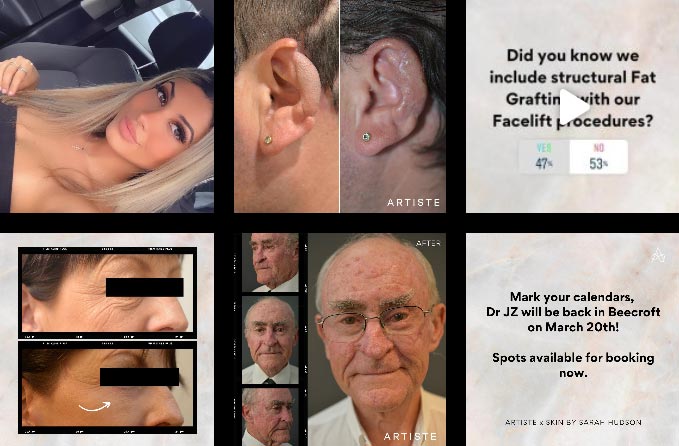What happens if I gain or lose weight after a facelift?
Model featured in photography
When considering facial procedures, factors like weight may not immediately come to mind. However, maintaining a stable weight can play an important role in optimising health before any procedure. For those exploring facelift surgery, understanding how body weight fluctuations may impact the process can be beneficial.
In this blog, Artiste Plastic Surgery provides general information on how body weight changes could relate to facial procedures. For personalised guidance tailored to your unique situation, we encourage you to consult with a qualified health professional.
Facelift: An Overview
A facelift is a procedure that tightens the facial muscles and supporting tissues, reduces or redistributes excess fat from the lower part of the face, and repositions the skin to look tighter.
The ideal candidates for cosmetic procedures, such as a facelift, are typically those who are at or near their optimal weight and practise healthy lifestyle behaviours, including balanced nutrition and regular exercise. Reaching a stable weight can support general health, which is an important factor in preparing for any medical procedure.
For more information and personalised advice, it is recommended to consult with your GP and qualified surgeon who can assess individual needs and provide guidance tailored to your unique situation.
Potential Effects of Weight Changes
Losing and Gaining Weight: Before Facelift
In preparing for a facelift or other facial procedures, maintaining a stable weight can play an important role in supporting your overall health. While weight stability is beneficial, it’s essential to remember that prioritising overall health is more important than focusing solely on weight.
Losing or gaining a substantial amount of weight prior to your procedure may impact facial contours, which may be considered during a consultation with your surgeon. To help with planning, it’s essential to follow any guidance provided by your surgeon and avoid any major changes to your health routine or surgical plans between consultation and your procedure date.
Losing and Gaining Weight: After Facelift
Following a facelift procedure, some patients may find themselves motivated to maintain consistent health and wellness. Significant changes in weight after a procedure may influence the appearance of facial contours and skin tightness over time. Prioritising health over specific weight goals can support both your well-being. It’s beneficial to discuss a balanced approach to weight maintenance with your healthcare provider.
For tailored advice on health and weight management in preparation for or following a facial procedure, consulting with a qualified health professional is recommended.
Consultation with A Board-Certified Plastic Surgeon
After a facelift, discussing weight management with your plastic surgeon can be helpful in supporting both your health and the results of your procedure. Being open about any weight-related goals during your assessment can help your surgeon provide personalised guidance that aligns with your health and wellness objectives. If you would like more information on facelift surgery in Sydney, reach out to Artiste Plastic Surgery. Our Specialist Plastic Surgeon Dr Jack Zoumaras has a deep understanding of the anatomy of ageing and a wealth of experience in facial procedures. Book a consultation with us today.
Disclaimer: At Artiste Plastic Surgery, our Plastic Surgeons led by Dr Jack Zoumaras have been trained to the highest possible degree. All surgery has risks and it is always advised to get a second opinion. Risks are very real and we cannot guarantee any result. Results are illustrated as a guide only. All risks are managed and any need for revision surgery or complications (1-5%) can be managed by our specialist plastic surgeons.
Any statements on how you will feel is based on Level V Evidence:
Level V: How you will feel after plastic surgery varies between individuals, depending on psychological and physical factors. Our internal research is based on how patients in our practice feel after surgery.
The blogs are not a substitute for a medical consultation and do not form as part of the doctor to patient relationship.
SHARE THIS ARTICLE
Oct08
Upper vs Lower Eyelid Surgery: What’s the Difference
Disclaimer: At Artiste Plastic Surgery, our Plastic Surgeons led by Dr Jack Zoumaras have been trained to the highest possible degree. All surgery has risks and it is always advised ...
Oct08
Blepharoplasty for Hooded Eyes: Before & After Guide
Disclaimer: At Artiste Plastic Surgery, our Plastic Surgeons led by Dr Jack Zoumaras have been trained to the highest possible degree. All surgery has risks and it is always advised ...
ABOUT ARTISTE
Artiste Plastic Surgery is an Award Winning Specialist Plastic Surgery practice led by internationally trained Dr. Jack Zoumaras, Plastic Surgeon and Peer Reviewed Face Surgeon
Artiste offers the latest Cosmetic Surgical Procedures of the Face, Breast and Body, inspired from leading centres around the world.
STAY IN THE LOOP
Enter your email address below to receive updates on new articles and VIP access to promotions and special offers.
FOLLOW US ON INSTAGRAM
